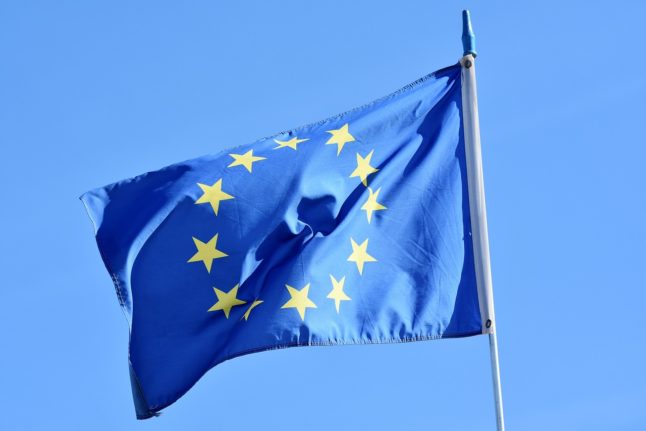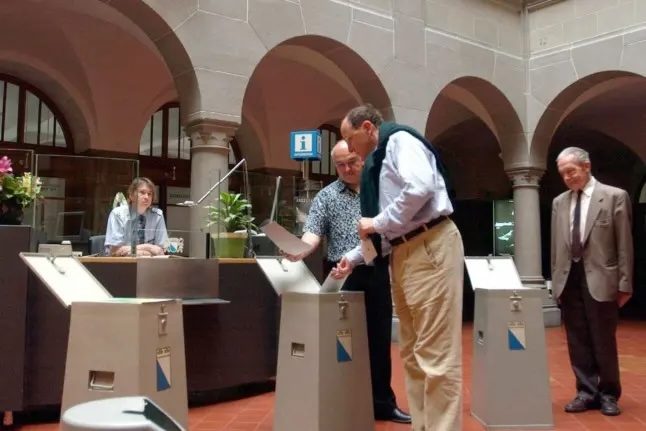The government, known as the Federal Council, said in a statement that it had concluded exploratory talks with Brussels, and had tasked the foreign ministry with drafting a mandate for proper negotiations by the end of the year.
READ ALSO: Is Switzerland set to reopen talks with EU?
In May 2021, Switzerland called off talks with the European Union, intended to seal a long-delayed cooperation agreement.
The move angered Brussels and strained the relationship between the two sides.
Now, however, Bern and Brussels have decided to reconcile, giving Switzerland and the European Union “cautious sense of optimism for the future,” according to Livia Leu, chief EU negotiator for Bern.
This willingness to reconnect “is a very important step towards the [renewed] negotiations,” she added.
We explore what the deal between Switzerland and the bloc means.
One way to describe Switzerland’s relationship with the EU is this: it doesn’t want to be part of the bloc, but it can’t live without it either.
“Switzerland has a very strong sense of independence; joining the EU would impinge on its autonomy,” according to political scientist Daniel Warner, former deputy to the director of The Graduate Institute of International and Development Studies in Geneva.
To date, Switzerland is one of only a handful of western European nations that have not joined the European Union, and yet it has strong ties with the bloc.
In 1992, Swiss voters narrowly rejected (by 50.3 percent) the government-backed plan to join what was then the European Economic Area of 12 nations.
The main argument that swayed the voters was that the country’s unique grass-roots democracy would be undermined if political decisions affecting Switzerland were made in Brussels rather than in Bern.
That particular argument also held true in 2001, when nearly 77 percent rejected the proposal to open membership negotiations with the EU.
Sometimes, Switzerland’s refusal to join its neighbours smacks of arrogance.
“Switzerland is too rich and too stable to want to join the EU,” said Fabio Wasserfallen, a professor of European politics at the University of Bern.
READ MORE: EXPLAINED: Why is Switzerland not part of the European Union?
However, despite its long-standing stance of neutrality and sovereignty, which fuels its opposition to joining the Union, Switzerland can’t exist without its European neighbours. And it knows it.
There are several reasons for this dependence.
One is that exports are the backbone of Swiss economy, with the EU and in particular Germany, being Switzerland’s main trading partners.
Switzerland relies on its access to the single market in other ways as well, all of which play a major part in the country’s economic prosperity. For this reason, Bern and Brussels have signed over 100 reciprocal treaties, covering not only trade, but also matters of cross-border security, research and education, agriculture, transport, environment, police cooperation, and a number of other agreements, which are outlined here.
One of the major ones is the Free Movement of Persons Agreement, which allows citizens of EU states to freely work and live in Switzerland, and vice-versa.
Another makes Switzerland part of the borderless Schengen area, making travel though Europe much easier and more convenient for Swiss citizens.
READ MORE: EXPLAINED: Which Schengen area countries have border controls in place and why?
What concessions has Switzerland made to get access to EU’s “perks”?
The cooperation between Bern and Brussels sometimes causes discontent on both sides.
In Switzerland, some people, especially right-wing parties such as the SVP and other populist groups like the recently formed Pro Schweiz, argue that the country has no business seeking stronger ties with Europe, at the detriment of its independence.
READ MORE: ‘Pro Schweiz’: What is Switzerland’s new anti-EU organisation and what is its aim?
On the EU’s side as well, some claim that Switzerland is ‘cherry-picking’ — that is, taking advantage of its nearly unlimited access to the single market without actually being part of it, basically taking the good bits and leaving the negative ones behind.
It is true that Switzerland doesn’t have to deal with issues like centralised policies or the necessity to support poorer countries and regions within the EU.
However, according to its agreement with the EU, the country does pay for the benefits it receives from its non-membership.
Take, for instance, the ‘cohesion payments’.
They are basically “entry fees” that Switzerland pays to Brussels for its access to the single market.
According to the government, “the goal of Swiss contributions to selected EU member states is to help reduce economic and social disparities… The Swiss contribution is an investment in Europe’s security, stability and prosperity. By making the contribution, Switzerland is also strengthening and deepening bilateral relations with its partner countries and the EU as a whole.”
This year, for instance, Swiss government handed over 1.1 billion francs to eight EU states as part of the latest “cohesion payment”.
The eight states set to benefit from the money are: Bulgaria, Croatia, Cyprus, Estonia, Hungary, Malta, Romania and Poland.
READ MORE : What are the ‘cohesion payments’ Switzerland pays to the EU?



 Please whitelist us to continue reading.
Please whitelist us to continue reading.
Member comments